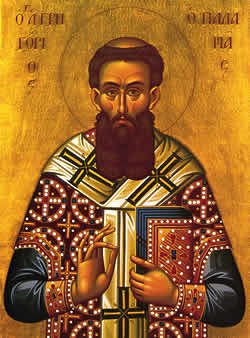I would continue sharing the thoughts of Gregory Palamas about Christ and the Holy Trinity. What the Three Persons do, he says, they do together, in unison. As St. Gregory of Nyssa teaches:
We do not learn that the Father does something on his own, in which the Son does not cooperate. Or again, that the Son acts on His own without the Spirit. Rather does every energy which extends from God to creation have its origin from the Father, proceed through the Son, and reach its completion in the Holy Spirit.
Here we have the classic schema of the divine economy: from the Father, through the Son, in the Holy Spirit – the divine operation of the Most Holy Trinity is always from the Father, through the Son, in the Holy Spirit.
But the fact remains that the distinction of persons, the diversity in God the Holy Trinity, is also necessary to maintain, since only one of the Three Divine Persons became man; only one of the Holy Trinity was born and crucified, though this is accomplished with the consent of the Father and the Holy Spirit. It is true, of course, that the Father gives His only-begotten Son, and the Holy Spirit testifies of Him as Lord and God. But the distinction of persons remains. We see this most concretely in the mystery of the Divine Eucharist, where the Spirit is present in Holy Communion as well as the Son, but it is a different kind of presence: the Spirit did not become incarnate, therefore the Spirit has no body and blood. We receive the body and blood of Christ, the Second Person of the Holy Trinity, not the body and blood of the Holy Spirit.
Hopefully as you reflect on this, it will become much clearer why the Fathers went to such great lengths to find the words that they did to express Who Christ is and Who God is!
St. Gregory Palamas also points out that Christ is not only the Sole Revealer of God, He is also the Sole Revealer of God’s purpose in His creation of man. God does have a purpose for our creation. In simple terms, what is true of Christ’s humanity can also be true for us – by grace. Christ is unique in that the union of human nature with His divine Person is hypostatic or personal. But the consequence of this hypostatic union, namely, the exchange of the natural properties of each of His two natures, serves as a model for our own salvation and deification. What is true of Christ’s humanity can also be true for us – by grace, that is to say, as a gift. If you reflect upon these ideas of Gregory you will probably sense how different they are from Western Christianity. This is our heritage!

